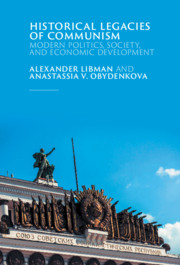Book contents
- Historical Legacies of Communism
- Historical Legacies of Communism
- Copyright page
- Dedication
- Contents
- Figures
- Maps
- Tables
- Acknowledgments
- Abbreviations
- 1 Introduction
- 2 The CPSU Legacy: Leninism or Clientelism?
- 3 Cultural Environment and Soviet Cinematography as a Legacy of the CPSU
- 4 Measuring CPSU Legacies
- 5 Democracy
- 6 Corruption
- 7 Inequality
- 8 Mortality
- 9 Attitudes Toward Migrants
- 10 Economic Development and Innovations
- 11 The Origin and Persistence of Legacies
- 12 Conclusion
- Bibliography
- Index
11 - The Origin and Persistence of Legacies
Published online by Cambridge University Press: 27 January 2021
- Historical Legacies of Communism
- Historical Legacies of Communism
- Copyright page
- Dedication
- Contents
- Figures
- Maps
- Tables
- Acknowledgments
- Abbreviations
- 1 Introduction
- 2 The CPSU Legacy: Leninism or Clientelism?
- 3 Cultural Environment and Soviet Cinematography as a Legacy of the CPSU
- 4 Measuring CPSU Legacies
- 5 Democracy
- 6 Corruption
- 7 Inequality
- 8 Mortality
- 9 Attitudes Toward Migrants
- 10 Economic Development and Innovations
- 11 The Origin and Persistence of Legacies
- 12 Conclusion
- Bibliography
- Index
Summary
This chapter studies three interdependent questions. First, it looks at what we call the “temporal depth” of the legacies: how far we can go into the past to observe a link between the variation in the CPSU membership rates across regions and the contemporary social and political outcomes? Second, we study the persistence of legacies: how does the effect of the CPSU legacies change if we look at more recent indicators of Russia’s regional development as opposed to earlier ones. We document high persistence of the effects of the CPSU legacy: while for some indicators the CPSU effects decrease over time (although remain significant), there are indicators for which the CPSU effects actually become stronger. Third, we study whether the CPSU legacy affected the variation across Russian regions in the 1990s (as opposed to the 2000s and the 2010s - i.e., the period we study in other chapters of this book).
- Type
- Chapter
- Information
- Historical Legacies of CommunismModern Politics, Society, and Economic Development, pp. 280 - 298Publisher: Cambridge University PressPrint publication year: 2021

